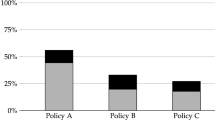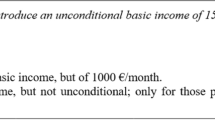Abstract
Do people vote in elections for reasons that have nothing to do with the possibility that their own vote may decide the result of the election? That is, do they vote for “expressive” reasons? There is no hard evidence in the real world which bears on this question. The nearest one can come to an answer is to ask people about why they have voted, but what people say they do is not necessarily the same as their behavior, which cannot be observed on this issue in real voting situations. The existence, or otherwise, of expressive voting is an important question, because the answer provides insights into explaining voter turnout (i.e. to help explain why people vote), as well as whether their vote ever changes as a result of a change in the probability that their vote will decide-the election (i.e. to help explain what people vote).
By conducting an appropriate experiment, however, direct evidence of whether some people vote expressively may be obtained. This paper describes such an experiment, and gives clear evidence for the existence of expressive voting.
Similar content being viewed by others
References
Aldrich, J.H. (1993). Rational choice and turn-out.American Journal of Political Science 37(February): 246–278.
Beck, N. (1975). A note on the probability of a tied election.Public Choice 23: 75–80.
Brennan, H.G. (1989). Politics with romance: Towards a theory of democratic socialism. In A. Hamlin and P. Pettit (Eds.),The good polity: Normative analysis of the State, 49–66. New York: Basil Blackwell.
Brennan, H.G. and Buchanan, J. (1984). Voter choice: Evaluating political alternatives.American Behavioral Scientist 28(Nov/Dec): 185–201.
Brennan, H.G. and Lomasky, L.E. (1985). The impartial spectator goes to Washington: Towards a Smithian theory of electoral behavior.Economics and Philosophy I(October): 189–211.
Brennan, H.G. and Lomasky, L.E. (1987). The logic of electoral preference: Response to Saraydar and Hudelson.Economics and Philosophy 3(April): 131–138.
Brennan, H.G. and Lomasky, L.E. (1993).Democracy and Decision. Cambridge: Cambridge University Press.
Brennan, H.G. and Pincus, J.J. (1989). Rational actor theory in politics: A critical review of John Quiggin.Economic Record 63(March): 22–32.
Carter, J.R. and Guerette, S.D. (1992). An experimental study of expressive voting.Public Choice 73: 251–260.
Chamberlain G. and Rothschild, M. (1981). The probability of casting a decisive vote.Journal of Economic Theory 25: 152–162.
Good, I.J. and Mayer, L.S. (1975). Estimating the efficacy of a vote.Behavioral Science 20(1): 25–33.
Lee, D.R. (1988). Politics, ideology and the power of public choice.Virginia Law Review 74(March): 191–198.
Lomasky, L.E. (1985). Is social security politically untouchable?Cato Journal 5(Spring–Summer): 157–175.
Orbell, J., Kragt, A. van de and Dawes, R. (1988). Explaining discussion-induced co-operation.Journal of Personalilty and Social Psychology 54(5): 811–819.
Tullock, G. (1967).Towards a mathematics of politics. Ann Arbor, Michigan: Univ. Mich. Press.
Tullock, G. (1971). The charity of the uncharitable.Economic Inquiry 9(December): 379–392.
Author information
Authors and Affiliations
Additional information
I wish to acknowledge the useful comments made by Jonathan Pincus on the design of the experiment, and the helpful advice of an anonymous reviewer of this journal.
Rights and permissions
About this article
Cite this article
Fischer, A.J. A further experimental study of expressive voting. Public Choice 88, 171–184 (1996). https://doi.org/10.1007/BF00130417
Accepted:
Issue Date:
DOI: https://doi.org/10.1007/BF00130417




